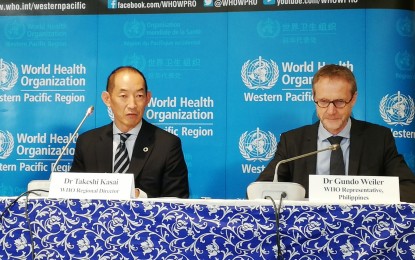
World Health Organization Regional Director for the Western Pacific Takeshi Kasai calls on leaders in the region to take a strong action and invest in primary health care. (Photo by Ma. Teresa Montemayor)
MANILA -- The World Health Organization (WHO) has urged countries in Asia and the Pacific to invest more on primary health care services as it celebrated World Health Day on Sunday.
In a press briefing on Friday at the WHO headquarters in Manila, WHO Regional Director for the Western Pacific Takeshi Kasai stressed that health is a human right and in order to enjoy it, "no one should have to decide between their mother’s medicine and their child’s education”.
"You need not be a rich country in order to provide primary health care to everyone. This World Health Day, I want to emphasize it is a very wise investment for health, unfortunately, there's not much investment on it in the past, but now we want to appeal, we want to change that," he said.
Kasai explained that primary health care is not only about treating people's diseases. It includes a range of services throughout life — from health promotion to screening for health problems, vaccines and information on disease prevention, family planning, treatment for long and short-term conditions, rehabilitation and palliative care, as well as treatment for common ailments like colds.
Through primary health care services, Kasai said non-communicable diseases (NCDs) such as diabetes, cancer and heart disease could decrease in number.
“We need strong primary health care so we can detect, screen and treat people at the community level, as well as provide information and advice to communities to prevent and manage these diseases. We need to act now to address the health challenges of the future as NCDs will be devastating for people and governments unless we invest today in primary health care,” he said.
Kasai added that investing in primary health care is key to the economic development of any country.
"Healthier people miss work less and contribute more to national prosperity. They are also able to improve prospects for their families. Robust primary health-care systems are the fairest, most affordable way to meet the health challenges we face today,” Kasai said.
WHO country representative Gundo Weiler, who was also in the press briefing, said the Universal Health Care (UHC) law is the Philippines' best chance to put the whole nation on the right track in the midst of economic and health challenges, ensuring that more Filipinos can get access to primary health care services.
"UHC is a sign of political will from all sides of the parliament, saying that health is the masterpiece of socio-economic development in the Philippines. The next steps would actually be to grow further the investments through the contributions from those who are able and taxes on alcohol and tobacco, and, we are one with the health department in the drafting of the implementing rules and regulations and this whole journey," he added. (PNA)
